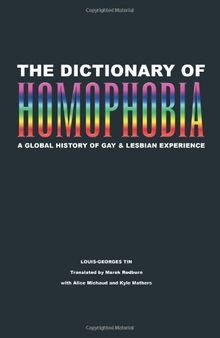 جزییات کتاب
جزییات کتاب
"Tin's Dictionary of Homophobia is so sweeping in its scope that one can dip into it again and again and learn something, or confront an idea in which even the most well-read queer will find fresh intellectual nourishment and historical illumination."—Gay City NewsBased on the work of seventy researchers in fifteen countries, The Dictionary of Homophobia is a mammoth, encyclopedic book that documents the history of homosexuality, and various cultural responses to it, in all regions of the world: a masterful, engaged, and wholly relevant study that traces the political and social emancipation of a culture.The book is the first English translation of Dictionnaire de L’Homophobie, published in France in 2003 to worldwide acclaim; its editor, Louis-Georges Tin, launched the first International Day Against Homophobia in 2005, now celebrated in more than fifty countries around the world. The Dictionary of Homophobia includes over 175 essays on various aspects of gay rights and homophobia as experienced in all regions in Africa, the Americas, Asia, Europe, and the South Pacific, from the earliest epochs to present day.Subjects include religious and ideological forces such as the Bible, Communism, Judaism, Hinduism, and Islam; historical subjects, events, and personalities such as AIDS, Stonewall, J. Edgar Hoover, Matthew Shepard, Oscar Wilde, Pat Buchanan, Joseph McCarthy, Pope John Paul II, and Anita Bryant; and other topics such as coming out, adoption, deportation, ex-gays, lesbiphobia, and bi-phobia. In a world where gay marriage remains a hot-button political issue, and where adults and even teens are still being executed by authorities for the “crime” of homosexuality, The Dictionary of Homophobia is a both a revealing and necessary history lesson for us all.



 دانلود کتاب
دانلود کتاب

 جزییات کتاب
جزییات کتاب

 این کتاب رو مطالعه کردید؟ نظر شما چیست؟
این کتاب رو مطالعه کردید؟ نظر شما چیست؟
